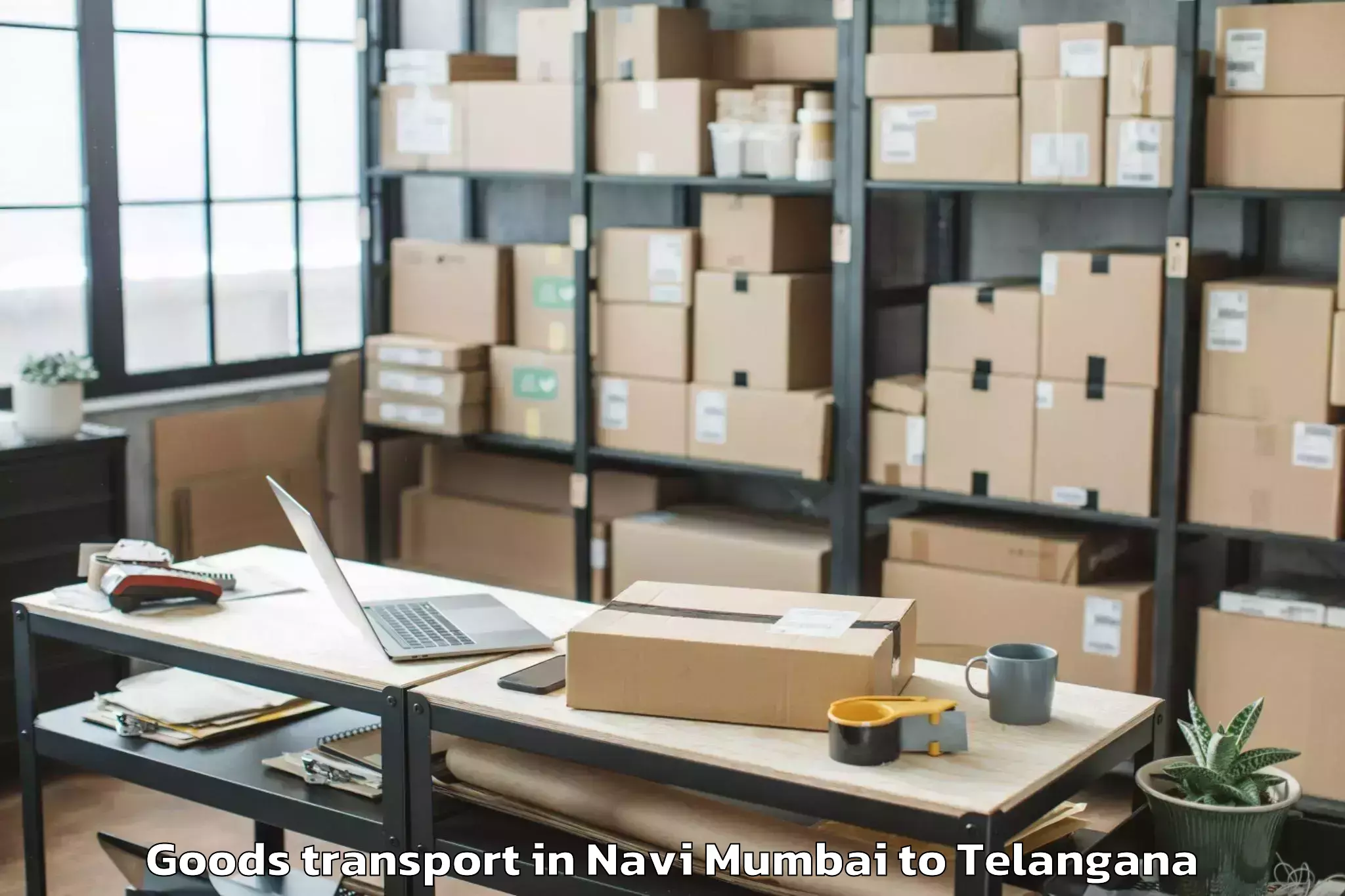Leading Navi Mumbai to Dharmapuri Jagtial Goods Transport Provider

Beyond just transport - we deliver peace of mind across India! Book the best services without any hassle from Navi Mumbai To Dharmapuri Jagtial, over a call. You can book various services like Bike Transport, Furniture transport solutions, End-to-end logistics, Package delivery, Cargo Mover, etc
Navi Mumbai To Dharmapuri Jagtial Goods Transport Service Details
| Date: | April 29, 2024 (29-4-2024) |
| Charges: | From ₹995 for Direct Pincode & ₹1995 for ODA Pincode |
| Destination City: | Dharmapuri Jagtial |
| Source State: | Maharashtra - MH |
| Delivery Type: | Door Delivery |
| Current Status: | Serviceable |
| Mode of Transport: | Road, Rail & Air |
| Consolidation: | In Sharing with Other Shipment |
| Source City: | Navi Mumbai |
| Source Geo Coordinates: | 19.0330488, 73.0296625 - (NorthEast L: 19.1861914, 73.1620789, SouthWest L: 18.8465126, 72.9042434) |
| Billing Weight: | As per weight, size, invoice value and pin codes. |
| Area/Zone: | Konkan Division |
| Other Cities: | Goods Transport in Allahabad to Dharmapuri Jagtial and Goods Transport in Amritsar to Dharmapuri Jagtial |
| Destination State: | Telangana |
| Nearby Cities: | Navi Mumbai Goods Transport for Dharmaram and Dhanwada Goods Transport in Navi Mumbai |
| Services: | Local package forwarding, Efficient package logistics, High-capacity freight transport, Heavy load shipping services, Large-scale cargo logistics, Essential freight services, Furniture relocation services, Advanced logistics, Household goods shipping, Advanced parcel dispatch |
Intermodal Transport Services: Seamless Solutions for Efficient Goods Transportation
In the realm of goods transportation, intermodal transport services play a crucial role in ensuring seamless and efficient movement of cargo. With the objective of maximizing efficiency and reducing costs, intermodal transport involves utilizing multiple modes of transportation such as rail, road, air, and sea to move cargoes from one location to another. This integrated approach offers numerous advantages including optimized routing options, minimized transit times, increased capacity utilization, reduced environmental impact through lower carbon emissions and improved supply chain visibility. By combining different modes of transport seamlessly under a single logistic umbrella with effective tracking systems in place; businesses can achieve faster delivery times while maintaining cost-effectiveness throughout the entire process.
Efficient Transport and Delivery Network: Definition and Importance
An efficient transport and delivery network refers to a system that enables the smooth movement of goods from one location to another. It involves various modes of transportation such as roads, railways, airways, and waterways. A well-designed network helps ensure timely deliveries, proper handling of products, cost-effective routing options, reduced transit times, improved inventory management practices and customer satisfaction. An optimized logistics network also facilitates better planning for demand forecasting through the analysis of historical data trends using advanced technology solutions such as artificial intelligence (AI) algorithms or Internet-of-Things (IoT). Overall productivity can be increased by deploying smart systems in managing supply chain operations that involve goods transport services at every stage – from loading/unloading points to final delivery destinations.
Quick and Efficient Goods Logistics Solutions for Seamless Transportation Services
In the field of goods transport services, quick goods logistics plays a crucial role in ensuring smooth and efficient transportation. It refers to the process of managing the movement, storage, and delivery of various types of goods in a fast and streamlined manner. Quick goods logistics involve tasks such as warehousing, inventory management, freight forwarding, customs clearance, route planning, and tracking shipments. By utilizing advanced technologies like GPS tracking systems and automated warehouse management systems (WMS), companies can optimize their supply chain operations for improved productivity and reduced delivery times. With an emphasis on time-sensitive deliveries, quick goods logistics enables businesses to meet customer demands effectively while maintaining cost-effectiveness.
Integrated Goods Shipment Services: Definition and Benefits
Integrated goods shipment services refer to the process of transporting products from one location to another, which involves a combination of transportation methods. This includes air freight, sea freight, rail transport, and road haulage - all combined into one streamlined service offered by logistics companies. The main benefit of integrated shipment services is that it provides customers with reliable and efficient shipping solutions for their business needs. With an integrated approach, businesses can access multiple modes of transport through a single point of contact while reducing costs associated with coordinating different carriers on their own. Additionally, this type of shipping service allows firms to optimize delivery times by choosing the best route based upon cost-effectiveness and distance traveled.
Part Load Shipping: Efficient and Cost-effective Goods Transport Solution
Part load shipping, also known as groupage shipping, is a logistics solution that allows businesses to transport their goods in a cost-effective and efficient manner. In this method, multiple shipments from different companies are combined into one shipment, optimizing the use of available space on trucks or containers. By sharing transportation costs with other clients, companies can significantly reduce their shipping expenses. One of the key advantages of part load shipping is its flexibility. It caters to small or medium-sized businesses that do not have enough cargo volume for a full truckload but still require reliable transportation services. With part load shipping, businesses can benefit from regular departures and fixed schedules offered by logistics providers without having to bear the entire cost of hiring an entire vehicle. Moreover, part load shipping contributes to sustainability efforts by reducing carbon emissions arising from empty vehicles traveling long distances. By maximizing the utilization of each shipment's capacity through consolidation techniques, this method offers an environmentally friendly alternative while minimizing fuel consumption. In conclusion, part load shipping provides a practical solution for businesses seeking affordable yet dependable goods transport services. Its ability to optimize resources and lower costs makes it an attractive choice for companies looking for flexible options tailored to their specific needs while promoting sustainable practices within supply chain operations.
